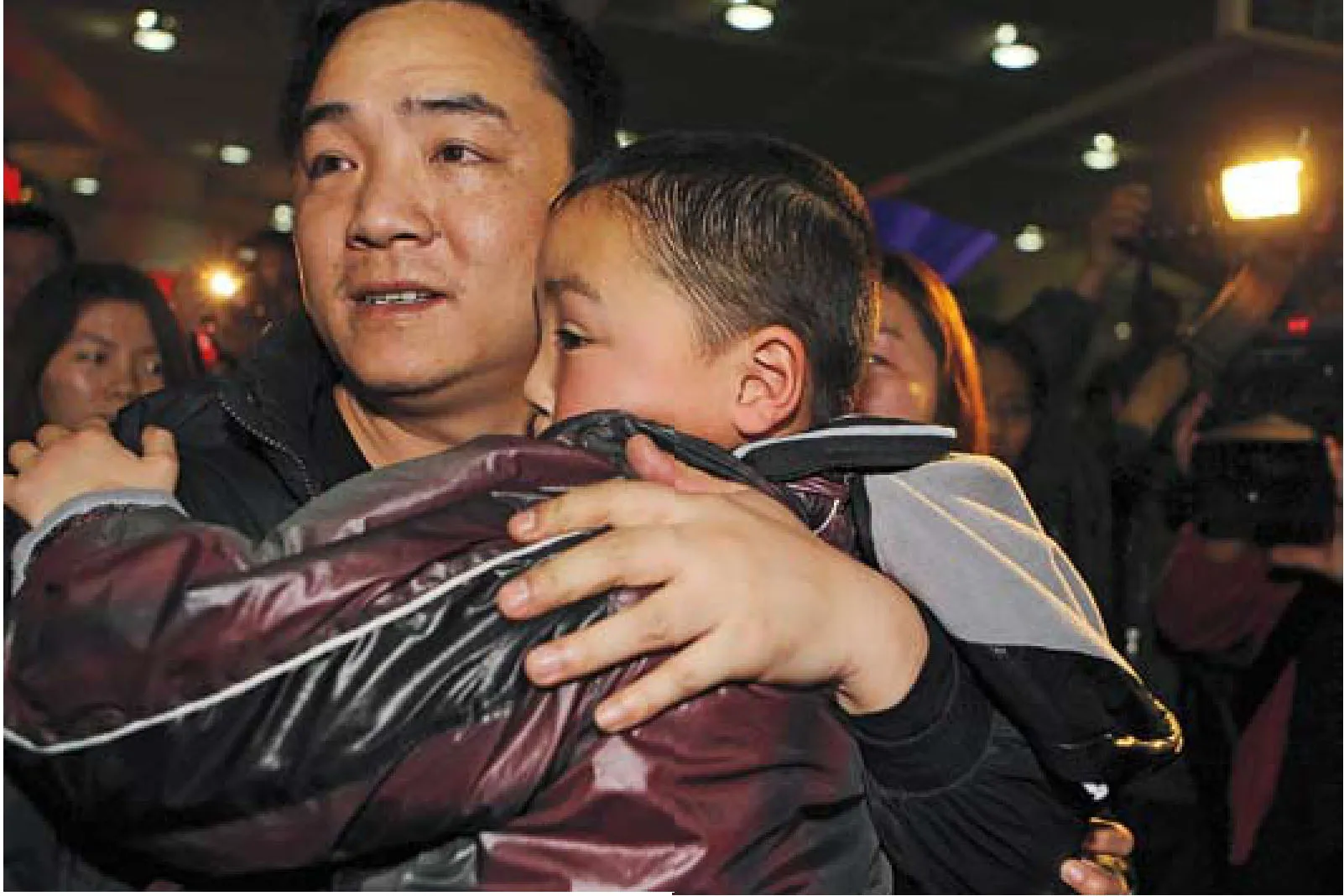Saving Child Panhandlers
2011-11-17ByYINPUMIN
By YIN PUMIN
Saving Child Panhandlers
By YIN PUMIN
Netizens launch an Internet campaign helping authorities save children forced into begging for money
On February 8, Peng Gaofeng reunited with his son who had been missing for three years. Peng, 33, lost his son, Peng Wenle, nicknamed Lele, on March 25, 2008, when a stranger kidnapped the 3-year-old in front of his grocery store in Shenzhen, south China’s Guangdong Province.
Six surveillance cameras caught images of the man escaping with Lele until they disappeared on a bus, but these clues didn’t help Peng and the police track down the kidnapper.
Since then, the family had been trying everything it could think of to get the boy back.
The father said he tried working with unsuccessful police efforts, advertising in newspapers, handing out fliers, offering rewards and writing blogs.
“I’ve opened 13 blogs on the Internet and posted my son’s photo everywhere online,”Peng said.
These attempts attracted attention, but didn’t lead to his son until Deng Fei, a reporter withPhoenix Weekly, participated.
Deng published a micro-blog attached with Lele’s picture to his 110,000-plus followers, and it was quickly forwarded more than 5,000 times.
On February 2, a netizen who had seen Lele’s picture found a child looking just like him in Pizhou, east China’s Jiangsu Province. He contacted Peng immediately. Peng then rushed to Pizhou to rescue the boy with the help of local police.
“It’s a miracle that could not be true without the help of netizens,” the father said.“Everyone can be an investigator with the help of micro-blogging.”
Peng’s son is believed to be the first missing child to be reunited with his family since a nationwide campaign was launched on the Internet in late January to save child panhandlers and help them reunite with their families.
The grassroots campaign was initiated by Yu Jianrong, a professor at the Institute of Rural Development of the Chinese Academy of Social Sciences, encouraging netizens to take snapshots of children they see begging in the street and of other children they think might have been kidnapped, and then post the photos on the Twitter-style micro-blogs in the hope that family members will see them.
In less than one month, more than 220,000 people joined the campaign and six abducted children have been reunited with their families.
“The micro-blog is a new channel for netizens to report leads to the police and monitor their handling of these cases,” Deng said. “The micro-blog can pool the power of millions of ordinary people, increasing the chances of fnding a lost child in such a large country.”
A large movement
Yu started the campaign in the form of a snapshot micro-blog, “Street Photos to Rescue Child Beggars,” on January 25.
He said on his micro-blog he came up with the idea on January 17 after he received a letter from a desperate mother, who asked him to help fnd her lost son she believed was abducted and forced into begging.
Yu said he would like to see the elimination of child begging by outlawing the practice and wanted to help more families reunite with their missing children.
The professor opened two micro-blogs on t.sina.com.cn and t.qq.com, two popular Twitter-like services.
Six volunteers were working to maintain the micro-blogs and one full-time employee will be recruited soon, Yu said.
“Micro-blogging may help put an end to people using children to beg. It also mounts an immense social pressure against traffcking children,” he said.
Statistics from the Ministry of Civil Affairs show as many as 1.5 million children are forced into begging. And a large number of them were abducted.
About 3,000 abductions of women and children are reported every year, according to the Ministry of Public Security. Yet many parents have not found their children, even with the help of the police.
Through Yu’s team and tens of thousands of netizens, more than 3,000 micro-blog posts with children’s pictures and other details were collected and published, with each one forwarded hundreds to thousands of times.
“The public enthusiasm exceeded our expectations,” Hou Zhihui, a volunteer who helps Yu maintain the micro-blogs, told Xinhua News Agency.
On February 21, Xunren.baidu.com, an online platform created by Baidu Inc., operator of China’s largest Internet search engine, was launched to help parents fnd their lost children among pictures of child panhandlers uploaded by netizens.
The platform has built a database containing thousands of pictures of both lost children and ones found on the street. Parents can possibly fnd their lost children by uploading profile pictures of them onto the platform, according to a report by the Shanghai-basedOriental Morning Post.
With advanced face-recognition technology, provided by the Chinese Academy of Sciences, the platform could match the lost children’s pictures automatically with the same or similar ones among those uploaded by netizens, said Wang Run, an engineer with Baidu.
People across China could also help street children fnd their parents by simply taking a picture of them and uploading it onto the platform, he said.

CFP
So far, thousands of pictures have been uploaded.
Authorities’ participation
Zhang Zhiwei, a lawyer and volunteer with the non-government organization Baby Come Home, said the rapidly expanding campaign showed the micro-blog is exerting a growing infuence on society and it can play a role in altering legislation and policies.
However, he emphasized such online activity needs to be better coordinated with government departments and NGOs dedicated to rescuing panhandling children, because the increasing number of photos will mean nothing without sorting, analysis and comparison.
“Whenever we see a micro-blog revealing a possible abduction case, we pass on the information to the police for verification,” Yu said. “Our volunteers are sorting out all the sources. We will try to set up a child panhandler database for further investigation.”
“The micro-blog cannot play a key role in rescue work. We still need to turn to the government for more reliable and effective measures,” he said.
On February 10, the Ministry of Public Security said the public could dial 110, a police hotline, if they suspected children were being organized or forced to beg on the streets.
“Addressing child trafficking and organized begging by minors needs the joint effort of all sectors of society,” said Chen Shiqu, director of the ministry’s anti-traffcking offce.
“Police will take minors whose blood relationship and identity cannot be determined, or those suspected of being abducted. Parents or relatives who use children for begging will be informed of laws and could face punishment,” Chen said.
In addition, the police will take blood samples of minors whose identities are unclear and their DNA records will be included in the national anti-traffcking DNA database, according to Chen.
Since April 2009, when the Ministry of Public Security launched a special campaign to combat traffcking of women and children, 5,900 criminal cases involving trafficking children have been uncovered, with 9,300 abducted children rescued by police, according to statistics released by the ministry.
Meanwhile, many local authorities have also responded positively and taken measures to intensify anti-child traffcking efforts.
In east China’s Zhejiang Province, an anti-abduction organization led by local police and joined by 31 government authorities was established.
In Qingdao, east China’s Shandong Province, local police initiated a campaign on February 10 to crack down on traffcking or manipulating minors to beg in the street.
The police in Guangzhou announced on February 11 it would continue using DNA information from juvenile panhandlers to help lost or abducted children reunite with their families.
Lost children who are delivered to police would have their DNA recorded for matching, said police authorities.
During the past two years, Guangzhou police have rescued 27 abducted children and helped fve of them reunite with their families through DNA tests.
Going further
“We didn’t expect it to become such a big campaign when we initiated the child-rescue micro-blogs, and now we want to put it on the right track,” Yu said.
More than 30 activists, including lawyers, scholars and celebrities, met in Beijing on February 12 on the child rescue campaign.
A special fund to provide long-term help for the nationwide crackdown on child begging will be set up in the near future, said Yang Peng, Secretary General of the Shenzhen-based charity One Foundation, after the meeting.
“The campaign needs to be more sustainable and more organized, which demands management and money,” Yang told Xinhua News Agency.
The fund would help transfer warmhearted people’s enthusiasm into sustainable aid, he said.
One Foundation, which was founded by action star Jet Li, had committed at least 200,000 yuan ($29,283) as the initial fund for the project, Yu said.
“Both civil affairs and public security departments are welcomed to send their delegates to join the management team of the fund,” he said. “This should help facilitate cooperation and information sharing with the government.”
“The fund will mainly sponsor child panhandler’s return to school, offer help to communities that receive rescued children and provide basic fnancial support for volunteers participating in the campaign,” said Li Chengpeng, a member of the preparatory committee of the fund.
However, the root cause of child traffcking should also be addressed when designing measures to help child panhandlers, Li said.
“Poverty, no access to education and many other factors that force children into begging should be addressed. Otherwise those children will be left in a worse situation,” he said
“It is only with a sound social security system that we can ensure the survival of children from impoverished families and stop them from begging in the street,” said Chen Tianben, a professor at the Chinese People’s Public Security University.
A motion to ban child begging and help those who have been rescued will be submitted to the National People’s Congress during this year’s plenary session of the lawmaking body in March, according to Yu.
“Our main purpose is to increase the awareness of the country’s top legislature on this issue and to call on different government departments to take concrete measures to guarantee all children’s rights and send child panhandlers back home and make sure they can live a normal life again,” Yu said.
a report from the public, they would rush to the scene and investigate the case.
